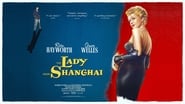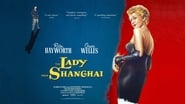Smartorhypo
Highly Overrated But Still Good
Tedfoldol
everything you have heard about this movie is true.
SpunkySelfTwitter
It’s an especially fun movie from a director and cast who are clearly having a good time allowing themselves to let loose.
Geraldine
The story, direction, characters, and writing/dialogue is akin to taking a tranquilizer shot to the neck, but everything else was so well done.
frankwiener
The one who survives in the end is no fool, Michael O'Hara. And don't you forget that.For me, this film is a visual feast, a cinematic adventure that is totally unpredictable in its roller coaster ride of deadly twists and turns. While the plot may seem confusing at first, it really isn't when the viewer considers that nutty Grisby's original plan went awry not once but at least twice. The adventure begins with an attack on a buggy in the middle of Central Park and then wanders down the sweltering coast of Mexico to Acapulco, up to the Sausalito waterfront, to an aquarium rendezvous where the size of wild sea life is notably exaggerated, to the unexpected destruction of a judicial chamber, through San Francisco's Chinatown including an escapade during a live production at the Mandarin Chinese Theatre, and a finale in the "crazy house" of an abandoned amusement park. So, what can be boring?Added to these high value visuals is the most appealing image of none other than Rita Hayworth sans her lustrous red hair, which has been drastically shorn and dyed platinum blonde. Anyone coming to the theatre in 1948 expecting Gilda of 1946 to appear was in for a shock, as I surely was decades later. And what exactly was Elsa Banister's connection to Shanghai? I had completely forgotten about the intriguing title until she suddenly erupts into Cantonese with the local population while fleeing through the streets of Chinatown. I very clearly understood Dietrich's and Wong's relationship to Shanghai in another movie, but Elsa's totally evaded me. I decided that it was just one more deliberate distraction to prevent us from closely following the plotted sequence of events, as if that would make any difference.Columbia executive Harry Cohn has been frequently criticized for reducing the length of the film from its original 155 minutes (that's over 2 1/2 hours, folks!) to its present 97 minutes, but I blame Welles more than Cohn for a film that had become unwieldy and excessively long. I was just fine with the final duration. I didn't feel that I needed any more exposure to sleeziness, duplicity, depravity, and degeneracy that what had already been offered. The human race is despicable and disgusting to its core. Got it, Orson!As to Welles' forced Irish brogue, as long as Cohn was rearranging the furniture, couldn't Mike O'Hara be just a regular guy from Kenosha, Wisconsin, which happens to be located on a very large lake that would lend itself to Mike's credibility as a skilled sailor. Did we really need Mike's superimposed Irish accent or was that just another deliberate idiosyncrasy among so many others here? Run, Mike, run, but, alas, there is no freedom from trouble, at least not for you, buddy. Trouble seems to follow you where ever you happen to find yourself. Nevertheless, you may pretend to be a fool, but you're truly a survivor, dude. You're like a cat with nine lives.
Phillim
. . . especially effective at showing how an honest, intelligent man will make the stupidest choices when lured by snakes. People say this movie is confusing -- I say look at the simple, personal, ugly-beautiful movie that it is and not what you imagine.Welles's fake-Irish stands up okay. Hayworth's negative capability never more apparent. Everett Sloane plays the sh*t out of one Cinema's purest evil, of the type who like to own and destroy people, slowly.Fans always rave about the funhouse mirrors finale, but so many astonishing set pieces to relish -- my fave is the Chinese theater sequence.And of course, 'Lady from Shanghai' is one in the must-see canon.
trimmerb1234
Boxer Mohammed Ali's reputation and super-confident show-boating in the ring used to over-awe opponents before a punch was thrown. And any appearance of Orson Welles seems to have a similar effect on reviewers - a page full of his oeuvre and comparisons therein. I've always taken Orson Welles as I found him without necessarily assuming he is the worlds greatest actor and or director.Here his acting is not especially good, not for the first time he has difficulty fitting his dramatic girth into a lesser figure, this time the Irishman - or rather Hoirishman - Mike, the well travelled drifter who knew danger when he saw it yet couldn't do a damned thing to stop himself. Yet perhaps Welles was stepping aside as an actor and giving the stage to the others. It is not the plot as such that grips, its the chemistry of the trio. It takes a certain worldliness and imagination to connect great beauty with great danger. It's the things that great beauty can make men do -the jealousy, competition to a murderous degree or to take self-annihilating risks.It is that same elemental male instinct which has animal rivals fight to the death over a female. Welles clearly knows first hand and it shows - Rita Hayworth never smouldered more. Everet Sloane, the crippled rich husband, manages to put such an edge on his term of endearment, "Love-er" for and to his wife as to constantly provoke doubts if he really is the easy cuckold or rather a cynical arch-manipulator. The oddball Grisby with his seemingly insane scheme. There is a constant pervasive discordant edginess perfectly evoked causing alarm bells to constantly ring in the audiences ears.It's this rather than any standard film criticism judgements which deeply impresses A 7.5
Antonius Block
This classic film noir has it all – a tight script, great scenes on location, and the seductive and beautiful Rita Hayworth. Orson Welles is in the role of the guy realizes he's swimming with sharks, but can't stop himself from doing so. Isn't that a common theme in these movies? At Hayworth's urging, he takes a job on her husband's yacht; her husband (Everett Sloane) is a rich, invalid lawyer who is having his wife followed. Things are uneasy from the outset, and then take a turn for the worse when Sloane's partner Grigsby (Glenn Anders) offers him money out of the blue to commit a murder – on himself, Grigsby. Glenn Anders looks like a maniacal Mike Ditka while making this proposition – oh wait, Mike Ditka already looks maniacal, but you get the idea.Rita Hayworth went blonde for this film, which apparently led to the ire of her fans, but she's a knockout and on top of it, she delivers a strong performance. I'm not sure about Orson Welles' Irish accent, but he did give us a great film, and it really was his baby, having written the screenplay, produced, directed, and starred in it opposite Hayworth, his wife of four years who he would divorce shortly after the film's release. The film has great scenes in San Francisco and Acapulco, the 'open air' feel of which provide an interesting counterpoint to the 'noir' plot. There is also, of course, the iconic final sequence in the hall of mirrors. The film is successful but it's too bad Welles wasn't given full creative control, as a great deal of that last sequence was edited out and destroyed, which is a real shame. One reason I like it is because despite some intricacies in the plot which will keep you guessing, it's all explained logically in the end. Another is Welles' direction, which is intelligent and provides interesting camera angles. I'm not sure why this movie was released to mixed reviews in 1947, but it's worth seeing if you like films in this genre.







